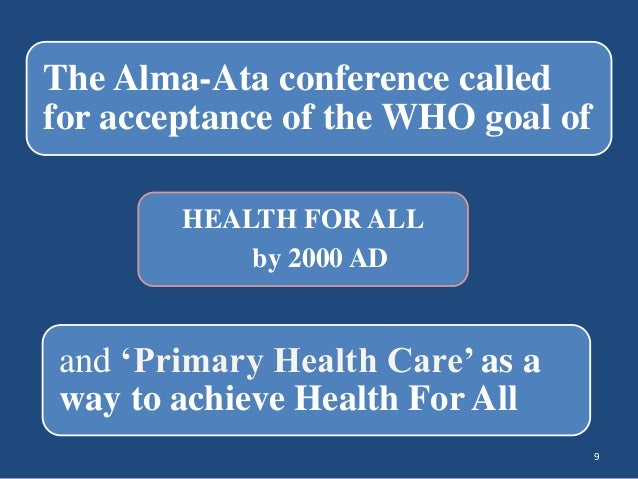PRIMARY HEALTH CARE
DEFINITIONS HEALTH-
According to WHO (1946), Health is defined as "A state of complete physical, mental, and social well-being and not merely the absence of disease or infirmity."
The Joint WHO – UNICEF international conference in 1978 at Alma-Ata (USSR) declared that

PRIMARY HEALTH CARE-
1978 Alma-Ate defined the “primary health care is essential health care made universally accessible to individuals and acceptable to them through their full participation and at a cost the community and country can afford.
Definition of primary health care
“Primary health care is essential health care, made universally accessible to individual and acceptable to them, through their full participation and at a cost the community and country can afford”.
PRIMARY HEALTH CENTRE
Primary Health Centre is an institution for providing comprehensives health care viz., preventive, promotive and curative services, to the people living in a defined geographical area.
PRIMARY HEALTH CARE
The “first” level of contact between the individual and the health system. Essential health care (PHC) is provided. A majority of prevailing health problems can be satisfactorily managed. The closest to the people. Provided by the primary health centers.

PRINCIPLES OF PRIMARY HEALTH CARE
1. Equitable distribution- Health services must be shared equally by all people irrespective of their ability to pay and all (rich or poor, urban or rural) must have access to health services.
2. Community participation-There must be a continuing effort to secure meaningful involvement of individual, family and community in planning, implementation & maintenance of health services.
- In India village health guide & trained dais, are selected by local community and trained locally in the delivery of primary health care to the community they belongs, free of charge.
- By overcoming cultural & communication barrier ,they provide primary health care in ways that are acceptable to the community.
- Health guide & trained dais are the essential feature of primary health care
3. Intersectoral coordination-–The declaration of Alma-Ata states that “primary health care involves in addition to the health
sector, all related sectors & aspects of national and community development , particular agriculture, animal husbandary, food, industry, education, housing , public work, communication and other sectors”
An important element of inters-sectoral approach that is planning-planning with other sector to avoid unnecessary duplication of activities.
4. Appropriate technology-Appropriate technology means technology that is scientifically sound, adaptable to local need, and acceptable to those who apply it and those for whom it is used, that can be maintained by the people themselves in keeping with the principle of self reliance with the resources the community and country can afford.
For example luxurious hospital, that are totally inappropriate to the local need and resources.
The basic requirements for sound primary health care.
The Basic Requirements for Sound PHC (the 8 A’s and the 3 C’s)
- Appropriateness
- Availability
- Adequacy
- Accessibility
- Acceptability
- Affordability
- Assessability
- Accountability
- Completeness
- Comprehensiveness
- Continuity
PRIMARY HEALTH CENTRE in INDIA
MUDALIAR COMMITTEE,1962
- Strengthening of existing PHCs and
- One PHC for 40,000 populations.
SHRIVASTAV COMMITTEE1975
Community health care should be provided by health workers who are from the same community after proper training. So that people health is placed in people hands.
STAFFING PATTERN
- Medical officer -1
- Pharmacist -1
- Nurse midwife - 1
- Health worker F (ANM) -1
- Block extension Educator -1
- Health Assistant (F)/LHV -1
- Health Assistant (M) -1
- UDC and LDC -2 (1 each)
- Lab technician -1
- Driver (if vehicle is there) -1
- Class IV -4
Total 15
MEDICAL CARE
OPD services:
- 4 hours in the morning and 2 hours in the afternoon/evening. Time schedule will vary from state to state. Minimum OPD attendance should be 40 patients per doctor per day.
- 24 hours emergency services : appropriate management of injuries and accident
- First-aid, stabilization of the condition of patient before referral.
- Dog bite/ snake bite/scorpion bite cases, and other emergency conditions
- Referral services
- In-patient services (6 beds).
MCH including family planning
ANTENATAL CARE
- Early registration of pregnancy and minimum 3 antenatal check-up
- Minimum laboratory investigations such as hemoglobin, urine albumin and sugar.
- Nutrition and health counseling
- Supplementation of folic acid and iron tablets and tetanus toxoid immunization.
- Identification of high risk pregnancies and appropriate management
- Refer to other hospital in case of high pregnancy beyond the management capability of medical officer in PHC.
INTRANATAL CARE
- 24 hours services for normal delivery
- Promotion of institutional delivery
- Conducting assisted deliveries including forceps and vacuum delivery whenever required
- Manual removal of placenta and
- Appropriate and prompt referral for cases needing specialist care.
POST –NATAL CARE
- Within 48 hours of delivery and 2nd within 7 days through sub centers staff
- Initiation of breast-feeding of delivery within half-hour of delivery
- Education on nutrition, hygiene and contraction and
- Provision of facilities under Janani Suraksha Yojana.
NEW BORN CARE
- Essential new born care
- Facilities and care for neonatal resuscitation
- Management of neonatal hypothermia and jaundice.
CARE OF THE CHILD
- Emergency care of sick child including Integrated Management of Neonatal and childhood Illness (IMNCI)
- Care of routine childhood illness
- Promotion of breast-feeding for 6 months
- Full immunization of all infants and children against vaccine preventable diseases as per guidelines and Vitamin A prophylaxis.
TRAINING
- Initial and periodic training of paramedics in treatment of minor ailments.
- Training of ASHAs.
- Training of ANM and LHV in antenatal care and skilled birth attendance.
- Training of AYUSH doctor in imparting health services related to National Health and Family Welfare programme.
NUTRITION SERVICES
- Diagnosis and management of malnutrition , anemia and vitamin A deficiency and coordination with ICDS.
MONITORING AND SUPERVISION
- Monitoring and supervision of activities of sub-centers through regular meetings/ periodic visits, etc.
- Monitoring of all National Health Programmes.
- Monitoring activities of ASHAs.